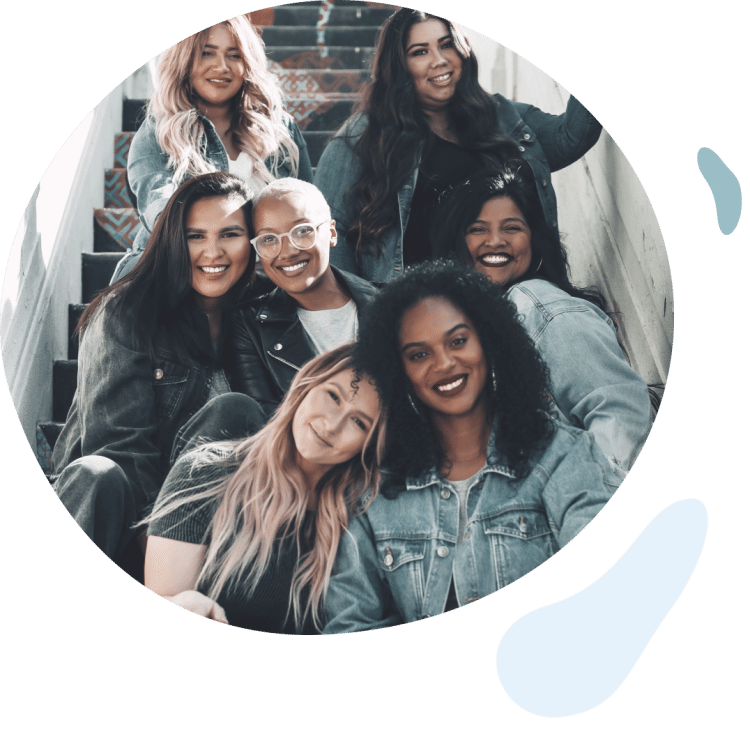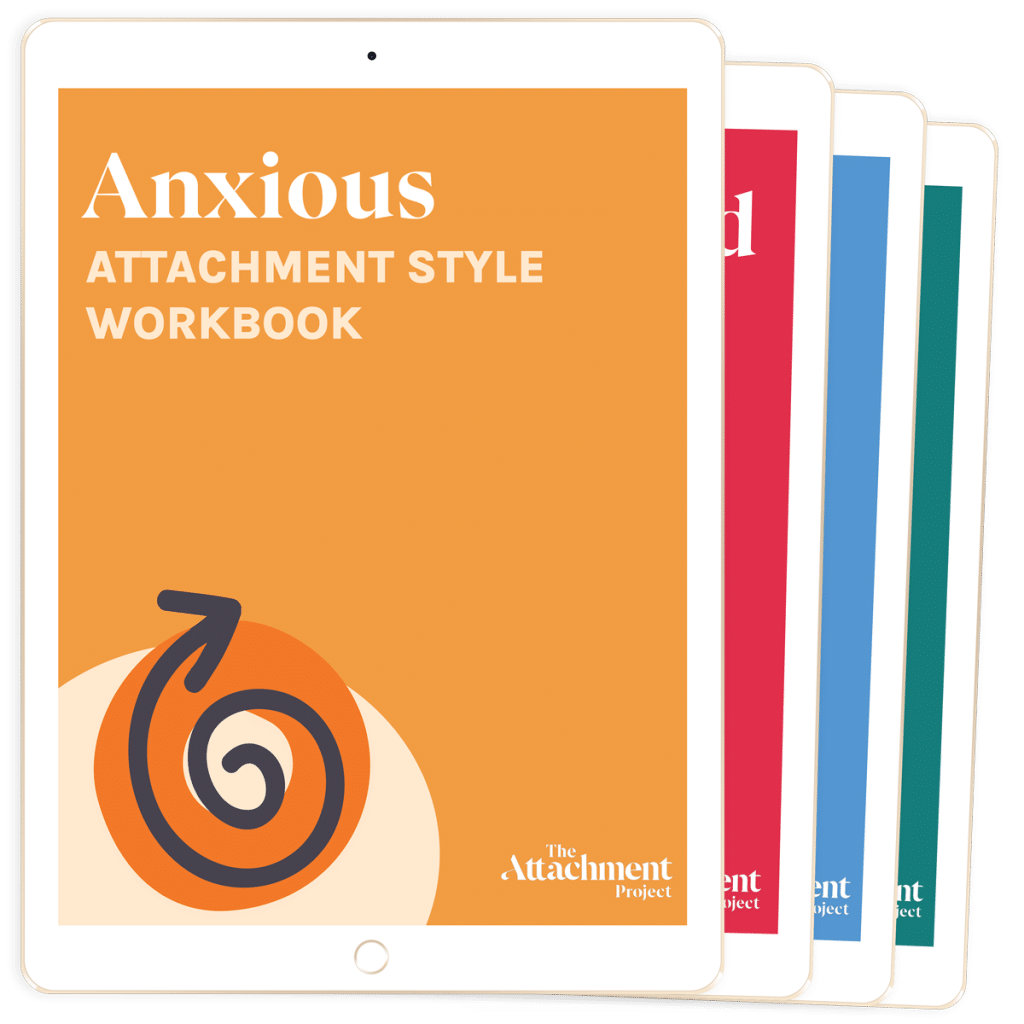

What if YOU Could Become More Securely Attached in ALL of Your Relationships?
Introducing A BRAND-NEW Holistic Approach To Repairing Attachment Styles What if YOU Could Become More Securely Attached in ALL of Your Relationships?

All Humans Are Hardwired For Connection…
But Not All Humans Are Wired Equally On How To Connect. Humans are social creatures – we’re hardwired from birth to want to connect with others.
However, we’re not all given a fair and equal start in life; some of us are more equipped to connect with others, and much of this is to do with our attachment style.
During your early formative period, if you weren’t shown…
- consistent love and care
- that your needs would be heard and met
- that you are safe and valued
- support for being who you truly are
…then you may have developed an insecure attachment.
Which makes it more complicated for you to form secure and healthy relationships.
If this is the case for you, then you might experience some complex emotions. On the one hand, you yearn for what everyone else does – a loving, healthy, and happy relationship that is free from inconsistency, rejection, or chaos. But your previous experience with relationships has shown you that other people cannot be trusted – you expect them to fail.
Instead of feeling cared for and valued within a relationship, you may end up feeling anxious, depleted, or fearful. These feelings often affect your actions within a relationship and can even end up validating your fears of not being worthy of love!

Depending on your attachment style, relationships may:
- Make it difficult to focus on work or the other important areas of your life
- Disrupt your sleep and make it difficult to relax, even when you’re exhausted
- Trigger deep fears of abandonment
- Cause hypervigilant behaviors such as checking your partner’s or your own phone constantly
- Keep you in your fight, flight, and freeze nervous system so that you’re constantly on high alert waiting for something bad to happen
- Involve pushing people away or feeling completely numb and losing interest when someone gets too close
- Include sabotaging relationships before the other person can reject you
Believe it or not – behaviors such as these aren’t uncommon! Approximately one-third of the world’s population is insecurely attached (even more, according to our data!), and yet the majority of these people are able to establish and maintain loving, healthy, and successful relationships.
This is because – despite not always knowing how to connect with others in healthy ways – it is possible to heal an insecure attachment. You too can be capable of receiving the love and acceptance that you desire and deserve!

How Can You Heal Your Attachment Style?
Your attachment style was formed as a result of the relationships you experienced during your childhood – therefore, one of the most effective ways to repair your attachment style is in relationships with others.
In the same way that an insecure attachment is formed in relationships, it can also be healed through them.
And the good news?
This repairing relationship doesn’t have to be a romantic one!
You can potentially heal your attachment style by…

1. Resolving Triggers & Maladaptive Behaviors by Reprogramming Them in Real-Time
“Eureka moments” of insight are great indicators of deep level functioning, but are they enough to change the ingrained patterns of thoughts and behaviors that you have had for the majority of your life?
Oftentimes, these flashes of insight are just that – flashes. Temporary and, therefore, not powerful enough to achieve long-term change.
For example, how often have you realized that you choose the wrong partners, or that you have a tendency to cling to toxic relationships? But yet you probably still repeat the same patterns over and over again. Simply having an awareness of the problem typically isn’t enough to change it.
Instead, it is necessary to reprogramme how you feel, think, and relate in order to successfully change behavior.
And the most powerful way of doing this is in “real-time”, during a relationship dynamic, and when you can be guided through the process.

2. Encountering People Working Through Similar Issues to Yours
In a group, you are given the opportunity to meet people that are going through the same difficulties and challenges as you are. They too are coming to terms with and understanding their own insecurities, fear, trauma, and anxiety. This collective experience may help you to comprehend your own experiences and recognize what it is that you need to heal. You can potentially learn and benefit from other people’s breakthroughs – other people’s “aha!” moments can help you to uncover your own.
You will feel fully seen, heard, and safe enough to be vulnerable – and with multiple people. This may enable you to share your experiences and be supported through them in a way that significant others in your life may not have been equipped to in the past.
What’s more, the skills that you learn in this group are transferable to all areas of your life, such as romantic relationships, work dynamics, friendships, and even how you yourself parent.

3. Realizing that Attachment Styles Don’t Just Relate to Romantic Relationships – They Affect All of Your Relationships
Chances are if you’re reading this, you want to become more securely attached to improve your romantic life.
But did you know that your attachment style affects ALL of your relationships? And not necessarily in the same way, either.
For example, you might behave anxiously in your romantic relationships and lack boundaries, but you might be avoidant in the workplace or in your friend group. Or perhaps you’re more avoidant in romantic relationships because being in love feels overwhelming and unsafe, but more giving in your friendships because giving love this way feels less threatening.
Attachment styles often work like a spectrum whereby you can have traits of the different insecure styles.
4 Reasons Why Most People Struggle to Become More Securely Attached
01 – You’re trying to “heal” all by yourself
It’s a common misconception that you can’t heal an insecure attachment style.
A lot of this is due to the fact that it’s deep level work that requires understanding and restructuring how you function on a mental, emotional, and physical level.
Does that make it impossible? Absolutely not.
02 – You’re trying to heal solely through cognitive awareness
Cognitive awareness plays an important role in your healing journey, but you might struggle to achieve change through courses or information alone.
Just because you recognize a thought or behavior doesn’t mean that they’ll immediately disappear! What’s more, the more you keep digging, the higher the likelihood of re-traumatizing yourself.
03 – It’s always someone else’s fault, not yours
It’s easy to point the finger at someone else when the relationship doesn’t work out. If they weren’t so inconsiderate and were instead more understanding, then everything would have been fine, right?
Well, here’s the hard truth:
Even if you dated the most “secure” or amazing partner ever, unless you do the inner work, your insecurities won’t disappear, as your attachment style will still be triggered by issues in the relationship.
04 – You’re used to settling for less in relationships
If you’ve never had a relationship where you felt safe enough to express your needs or be vulnerable, then chances are that you’ve never experienced how nourishing, energizing, and beautiful the right relationship can be.
Because your template for relationships is based on your early years, it makes absolute sense that you would continue to settle for less than you deserve. To you, this is normal – you might not even realize that it’s possible to have your needs met in a relationship!
The important thing to understand right now is that your attachment style ISN’T a life sentence. You are not “broken” – with the right support, you can heal the impact of your early experiences and lead a rich life full of successful and healthy relationships.
Start the path of attracting love & happiness

Introducing: The Attachment Repair Group Process
The complete and holistic approach to becoming more securely attached
The Attachment Repair Group Process is for anyone who identifies as having one of the three different types of insecure attachment (anxious-preoccupied, avoidant-dismissive, or disorganized).
This repair process is a 3-month journey made of two parts:
- Weekly group sessions that are facilitated by a highly experienced psychotherapist
- Cutting-edge courses and workbooks on attachment theory, somatic healing, and Taoism
The Attachment Repair Group Process is a layered approach that has the potential to reprogramme how you function relationally, emotionally, mentally, and even spiritually.
It provides the opportunity to unlearn maladaptive thoughts and behaviors around relationships and embrace what a secure attachment feels like in your mind and body.

The Attachment Repair Group Process isn’t just another training program…
Through it, you’ll learn about the different attachment styles and how they impact your life on a deeper level. More importantly, you’ll be given the opportunity to become skilled in the tools and techniques involved in reshaping the entirety of you; your mind, body, emotions, and spirit.
Ultimately, the process can equip you to handle the challenges of the different relationships in your life.

The Attachment Project Repair Process includes…
Weekly 90-Minute Group Sessions (via Zoom Video Calls)– For 12 Weeks
During these weekly 90-minute group sessions, you will interact meaningfully within a group setting.
Group processes have been shown to be one of the most effective forms of intervention for people with attachment issues. This is because, in the same way that your insecure attachment was formed through relationships, it can also be healed through relationships.
**Even if you don’t feel comfortable sharing in a group situation at the start, as you grow more comfortable and confident in the process, you will likely feel more at ease with yourself and the others in your group. It may ultimately end up being a space where you feel safe enough to be vulnerable and your true self.**
Therefore, as a direct result of these weekly interactions, you will experience change in gradual but profound ways. This will affect how you function securely within relationships, whether these relationships are romantic, parental, friendships, family dynamics, or workplace-based.
The group sessions will be facilitated by Stephanie O’Connor, a highly experienced psychotherapist, attachment specialist, and healer in numerous modalities. Stephanie has extensive experience in helping people to become more securely attached.

Here’s a sneak peek at what you can expect :
- weekly group sessions (Zoom Video Calls) for 3 months where you’ll share issues that you have experienced in your relationships and receive guidance on how to resolve or navigate these issues in new ways
- guidance on how to process uncomfortable thoughts, emotions, and bodily sensations when issues arise during the sessions – by working through issues in “real-time” you’ll become skilled at making adaptive and effective changes
- a safe and confidential space where you can slowly reveal parts of yourself to others that perhaps you’ve never felt secure enough to show before. Through this, you can start to repair these elements in a non-judgemental environment.
- group support as everyone else shares similar issues as you. Normalizing your experiences can help you to feel less isolated and alone, as well as release unnecessary shame and self-blame
- group social skills as you’ll learn how to connect, communicate, and be vulnerable in a safe group setting
- guidance from an experienced psychotherapist who will be facilitating the sessions and supporting you through your journey
- the chance to understand yourself on a deeper level – every member of the group acts as a mirror for you to see yourself through their eyes, potentially unveiling blind spots that may be acting as barriers to healing
- tailored exercises and discussions as issues come up for you and the other people in the group experience
Plus, To Complement The Group Experience, You’ll Also Get Access To These 3 Powerful Online Courses:
In addition to the weekly group video sessions, you will also get access to 3 online courses which are designed to help train your body to feel secure, adopt healthier boundaries, develop a stronger character, and use Taoist practices to heal your mind and body.
Here’s a sneak preview of each of the courses:
The philosophy of Bodynamic is that attachment forms in the body, not in the mind.
Through the guided physical practices in this course, you will learn what being secure feels like in your body, so that you can recognize it and embody it.
And most importantly, use this information to start feeling and acting more secure in your relationships with others.
Through Bodynamic’s course “Attachment & Bonding” you’ll discover:
- how early and late childhood attachment plays out later in life (helping to explain difficulties in forming and maintaining relationships)
- powerful physical practices to show you what secure attachment feels like in your body
- how to evoke a sense of safety and security when your attachment traits are triggered – for example, if your boss gives you negative feedback and you become highly anxious about being fired
- how to regulate your emotions and calm yourself through your body when you’re feeling highly anxious or are in a stressed state – for example, if a date doesn’t text you back and your fear of abandonment kicks in
- how to build a strong sense of self-worth so that you can deal with rejection and conflict in a more balanced way
- how to understand and communicate your needs, set healthy boundaries, and feel more at peace
- Who you truly are as well as what drives you
- why you find it difficult to commit to others in relationships or commit to important life decisions in general
- how to maintain your personal power around others because you feel more connected and confident in yourself
- how to say “no” to others and make decisions that are more aligned with your needs, values, and limits
- why you don’t always need to give your heart away fully when you’re in a relationship (or use your sexuality to get love)
- how to give authentically from your heart, but without losing it
Included in the course:
- Lessons: 20
- Guided Practical Exercises: 9
- Course Duration: 110 minutes
- Course Format: Pre-recorded video lessons
- Course Leader: Ditte Marcher /CEO & Senior Instructor at Bodynamic International
Do you ever feel overwhelmed in relationships? Or like people don’t respect your boundaries and invade your personal space? Well, in Bodynamic’s course “Boundaries & Energy Management”, you can learn how to navigate these uncomfortable thoughts and feelings in a healthy way – one that doesn’t push others away.
Through this course, you can gain a deeper understanding of the difference between energy management and boundaries in relationships, as well as learn practical exercises to more effectively balance your emotions and your sense of self in social contexts.
Here’s what you can learn:
- a deeper understanding of the difference between energy management and boundaries in relationships (and how to identify the areas in which you struggle most)
- practical exercises to better balance your emotions and your sense of self when in social situations or when you’re having an “off-day”
- how to recognize and communicate a “hard no” and when you need to establish boundaries with someone
- how to recognize and communicate when you need space so you can regulate your emotions
- how to tune in to your limits and personal space so you don’t feel overwhelmed or like others are pushing your boundaries
- how to manage your emotions within your body without suppressing them or becoming overwhelmed
- how to manage impulsive reactions during stressful situations (for example, feeling unheard or disrespected during a dispute)
- Emotional regulation strategies that can be used in real-time so that you don’t spend hours, days, or weeks ruminating on a situation
Included in the course:
- Lessons: 18
- Guided Practical Exercises: 13 [6 on Boundaries & 7 on Energy Management]
- Course Duration: 50 minutes
- Course Format: Pre-recorded video lessons
- Course Leader: Ditte Marcher /CEO & Senior Instructor at Bodynamic International
In this course, you’ll discover ancient Taoism teachings and practices that can help you to heal your body from existing imbalances, as well as cleanse your mind from unpleasant emotions.
You’ll discover the Qigong philosophy regarding the connection between the body and mind, and use this to uncover blockages in your body, as well as work on restoring your physical and emotional balance.
Even if you are new to Taoism or meditation, the practices of emotional alchemy are easy to understand and can be incorporated into your daily routine.
Here’s what you’ll learn:
- two powerful meditation techniques to cultivate self-compassion and healing (the Inner Smile Meditation and the Six Healing Sounds Meditation)
- the main causes of your physical or psychological imbalances
- how to cleanse your mind from painful emotions so that you can fully enjoy life and experience the present moment
- how to achieve mental and physiological balance and cultivate self-compassion and loving-kindness
- how excess heat gets trapped between your organs and it can cause physical and mental issues (and how to release it)
- how to access a state of deep relaxation, even if you’re brand new to meditation
- the Taoist way to improve your concentration skills
- the 7-point meditation posture so your practice feels more comfortable, beneficial, and enjoyable
Included in the course:
- Lessons: 15
- Guided Practical Exercises: 7 [Inner Smile Meditation + 6 Healing Sounds]
- Course Duration: 80 minutes
- Course Format: Pre-recorded video lessons
- Course Leader: Jampa Mackenzie Stewart – Senior Healing Tao & Internal Alchemy Instructor
Exclusive Bonuses:
In addition to the online group video sessions and the online courses, to accelerate your breakthroughs and transformation, you’ll also get access to two workbooks that will help you understand the different ways in which your childhood and adolescence experiences impact your daily life.

Based on your Free Attachment Style Quiz result, you’ll receive a personal attachment style workbook that consists of approximately 200 pages of diverse and evidence-based content on your attachment style and how it’s related to different aspects of your life, such as friendships, career, self-image, sexuality, and parenting. Your workbook also contains exercises designed to guide and facilitate the processes of self-reflection and awareness.
Similarly, the second workbook you’ll receive – the maladaptive schemas workbook – is based on your results from our Free Maladaptive Schemas Quiz.
This workbook will teach you everything you need to know about schema theory, early maladaptive schemas, and how understanding these topics (and their relevance to you) can help you improve your life.
Questions You May Have Before Saying “Yes! I Want To Join The Attachment Repair Group Process!”
Are the weekly 90-minute sessions considered “therapy”?
No – this is not therapy, although it is facilitated by a psychotherapist with over 12 years of experience.
This is a group experience where we’ll be using a variety of healing modalities each week to process emotions, reprogram thoughts, share experiences, use proven techniques in real-time, and be supported by a group of people who understand your pain, frustrations and fears in relationships on a very personal and compassionate level.
This experience will support, guide, and give you practical tools so you can experience profound revelations and transformations – but you will not be given “advice” or receive “therapy.”
If you’re looking for therapy to help you deal with extreme trauma or to help you manage a mental illness, please seek help from a therapist who can give you the individual support that you may need.
Will the weekly sessions be recorded if I want to listen to them afterward?
Will I still have access to the online courses once I’ve finished the 3-month group sessions?
Yes, the courses and workbooks will be available for you to use after the course.
You’ll be granted access to the online courses up to 24 months after the completion of the group sessions.
The workbooks, on the other hand, are downloadable for you to keep!
I’m considering a different course or counseling to help me with my attachment style – what makes the Attachment Repair Group Process different?
This is a unique and brand-new experience that offers intensive, tailored support that you can’t find in other online courses.
The group attachment repair sessions can potentially lead to a positive transformation as you’re learning how to be more secure in a group environment, all the while benefiting and learning from everyone else’s breakthroughs.
It will be an opportunity to practice setting boundaries, resolving conflicts, listening actively, expressing needs and desires, rewiring beliefs, examining defenses, cultivating empathy, and being authentic.
What if I don’t feel comfortable sharing in a group situation?
We get that sharing painful experiences or thoughts or emotions within a group can make you feel uncomfortable, exposed, and vulnerable – especially to begin with.
It’s going to be a space where you can be entirely yourself and start to heal the parts of yourself that you’ve hidden, pushed away, or even shamed.
And as you become more comfortable and confident in the process, you’ll start to feel more “at home” with yourself, and with others too.
Plus, someone else’s “aha!” moment or healing can trigger your own. You’ll learn so much from everyone else’s experience, and it will help normalize what you may have been feeling alone with your entire life.
Will I be considered “securely attached” after 3 months?
No one can make such a promise to you, so we certainly will not!
But what we can tell you is that after 3 months of weekly group sessions, in addition to the 3 courses and the 2 workbooks – you’ll start thinking, feeling and behaving differently.
You will start to relate to people in a more secure, healthy and balanced way. And you’ll feel a greater sense of peace within yourself.
You may classify yourself as “securely attached” – or you may find that this experience has moved the needle in a significant way and that you’re a lot closer to becoming securely attached.
Each individual’s progress is dependent on how much work they put into the process and where they’re at in their healing journey.
If I change my mind after enrolling, can I get a refund?
The short answer is “no, we’re not offering refunds.” Here’s why: this is a 3-month commitment you’re making to yourself and to a group of people who are also on a journey to becoming more securely attached.
Once we begin the process, we’re in it together, as a team… or in some ways, a family – as collectively we’ll be helping each other in a multitude of ways.
Given this, it’s an important commitment that you should only embark on if you feel like you’re ready to transform the way you relate to others, and to yourself.
If you make the decision to join, we ask that you honor and take responsibility for this decision (which for some people, might be an integral first step to breaking their flip-flopping tendencies).

Our Dedication To You
The Attachment Project is dedicated to offering these group experiences in order to support you to cultivate a deep sense of belonging, help develop social and emotional intelligence and practise relational skills. These group experiences will disrupt patterns of isolation and alienation and build new neural templates of safety, security and regulation in relationship to others.








 Get mental health tips straight to your inbox
Get mental health tips straight to your inbox